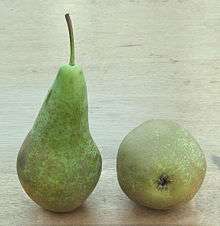Conference pear
| Conference pear | |
|---|---|
 Conference pear | |
| Genus | Pyrus |
| Species | Pyrus communis |
| Cultivar | 'Conference' |
| Breeder | Thomas Rivers |
| Origin | Britain |
.jpg)
A Conference pear is a variety of pear.
It is an autumn cultivar (cultivated variety) of the European pear (Pyrus communis). This variety of pear was developed in Britain by Thomas Francis Rivers. It owes its name to the fact that it won first prize at the National British Pear Conference in London in 1885.[1]
Description

A medium sized pear with an elongated bottle, the 'Conference' pear is similar in appearance to the 'Bosc pear'. A table pear, it is suitable for fresh-cut processing.[2] The fruit skin is thick greenish-brown, becoming pale yellow when ripe. The flesh is white, but turns pale yellow when the pear is ripe. The texture is very fine and soft, and the flavour is sweet.[3] The brown part of the skin is called russet or russetting, it is more or less apparent depending on weather conditions.
Cultivation and production
The 'Conference' pear adapts to a variety of conditions, and is widely grown in Europe. It thrives on land which is sunny, rich and not too chalky. In France, the production areas of this variety is mostly in the north (Loire, North Picardy) and the Alps (Savoie and the little Southern Alps). It is grown commercially in many areas of the United Kingdom.[1]
Production will be enhanced by the nearby presence of pollinating varieties such as the Williams pear. It is a particularly resistant fruit, especially against scab. The Conference pear can be eaten until January if kept cool in a refrigerator or cellar ventilated.
There is strong sales competition in Europe from neighboring countries (in order: Netherlands, Belgium, Spain and Italy). The flavour of 'Conference' pears grown in Savoie, was recognized in 1996 by a PGI (Geographical indications and traditional specialities (EU)), and 2012 it was the only PGI obtained by a pear in France.
References
- 1 2 Pamela Shields (1 July 2013). Hertfordshire A to Z. History Press Limited. pp. 141–. ISBN 978-0-7509-5320-7.
- ↑ Nirmal Sinha; Jiwan Sidhu; Jozsef Barta; James Wu; M. Pilar Cano (20 June 2012). Handbook of Fruits and Fruit Processing. John Wiley & Sons. pp. 1000–. ISBN 978-1-118-35263-2.
- ↑ Healing Foods. DK Publishing. 1 May 2013. pp. 23–. ISBN 978-1-4654-1631-5.
- Royal Horticultural Society - Pear Conference
- (in French) Agreste - Ministère de l'agriculture Information sur la production en France
- (in French) INAO - PGI/IGP SAVOIE.